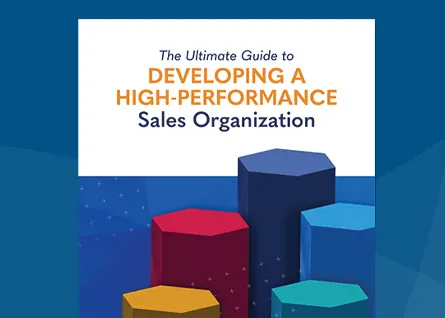The Insider’s Guide to a Sales Talent Audit

With the NBA season and draft complete, free agency is in full swing. Though there are no games, fans stay busy tracking contracts and trades. While not as exciting, it gets intense. Who’s a good fit? How does chemistry change? What are a team’s odds of improved performance and a title?
As basketball is an apt metaphor for sales, it’s a great time to discuss a sales talent audit. After all, when the sales environment shifts, teams need to reshuffle and improve to keep up. Last season’s team may have done well, but markets fluctuate, and the competition gets stronger. Yesterday’s sales team might not stack up against tomorrow’s challenges. Here, let’s look at what a talent audit is, why you need it, how to do it, and when to conduct it. We’ll also explore tips for leading a successful sales talent audit.
What It Is
A sales talent audit is a detailed evaluation of your current personnel. It can also be leveraged to see if new applicants make a good fit. It is an assessment of their skills, abilities, and readiness to drive business. It aligns your team with your strategy and helps managers identify gaps. As sales teams assess their goals and quotas, a talent audit can ensure your team is prepared and motivated to achieve.
Why You Need It
The biggest lesson from the pandemic was how industries change in an instant. It showed how reps, managers, and organizations are always one step ahead of catastrophe. Whether it’s government regulations, travel advisories, or acts of God, organizations can’t be complacent. They must have the right people in position to succeed.
How to Do It
In sales, the best organizations consistently refine and update their processes. This helps them adapt to changes, both internal and external, and provides a roadmap for repeatable success. A sales talent audit is no different. Here are a few essential steps for your talent audit:
Define Roles: More than merely listing each role in your organization, consider the specific skill sets and levels for each. Also, note overlapping roles, such as Project Manager/Senior Project Coordinator, Customer Service Rep/Lead Customer Advisor.
Note Skills: Here, start with the behaviors needed to achieve success. These include calling, emailing, greeting, etc. Also, note preferable attributes, like a fun and engaging personality, someone friendly and personable.
Next, get into the specific skills, such as active listening, reading body language, excellent written and verbal communication. Remember, some roles require more extensive technical skills. Be specific, such as four-years as a Senior Account Manager with two-plus years in L&D. Also, list extensive technical skills, like familiarity with complex electrical components and schematics, along with required certifications. Consider the software needed for each title.
Survey Team Members: First, talk to your team. Get their input. Often, team members will adopt additional responsibilities not listed in their official job description. Or else they develop unique tips and tricks that make their jobs easier. Know these things before you survey to gain the most insight.
Be sure to communicate the exact purpose of your survey, “This is for a talent audit.” Also, keep survey questions as specific as possible:
“How often do you reach out to new leads?”
“How long does it take to reach out?”
“What about established clients?”
“What is the average number of decision makers in your account base?”
Analyze Results: More than noting who does what, in a talent audit, be forward thinking. Look for which reps would excel in a new position, such as moving a BDR to AE. Also, which might require a new or additional title, such as Senior or Lead.
Remember, the goal is to get the most accurate picture of your team. This helps recognize the skills gaps you need to fill, organizational redundancy, potential successors, and future needs.
When to Conduct It
In the good old days, sales organizations forecasted their calendars and anticipated their needs. They planned for product rollouts, expansions, and restructuring. They had the luxury of yearly or bi-yearly talent audits. However, the pandemic showed industry changes on a dime.
Sometimes, LeBron James or Steph Curry turn an ankle. When this happens, the team can’t wilt. The best organizations need a bench stacked to fill the void. A talent audit can help you prepare.
Expect the Unexpected
Today, the unexpected must be expected. If you wait for the next pandemic, bear market, or burst bubble, you will be left behind. Instead, shorten your timelines. Think of your talent in relation to current events and industry trends. Note external forecasts, such as:
- Laws and regulations
- Supply chain issues
- New competition
- Shifts in consumer behavior
Rather than conducting audits to coincide with major plans, quarterly audits can ensure readiness to change.
Along with industry shifts, organizations change. Perhaps you’ve gained clients in new verticals. Or you’ve traded some blue chips for startups. These changes can necessitate new talent. Today, many reps work remotely or in hybrid modalities. Talent audits ensure your sales team matches your current situation, which can include:
- Schedule changes
- Modality shifts
- Workforce attrition
- Promotions and layoffs
- New job descriptions
Of course, these changes can affect performance. As such, leaders and managers might update duties and responsibilities. They may adjust goals and quotas, which impacts compensation. As part of a talent audit, consider restructuring comp plans to incentivize remote reps and keep them motivated.
Additional Considerations
Now that we’ve examined the What, Why, How, and When of talent audits, here are some additional tips:
Evaluate New Talent
As times and economies shift, the talent pool shifts as well. Of course, sales teams seek the best and brightest available. However, “available” is a variable. In basketball, GMs must know which players are on the trade block or looking for an out. In the same way, sales leaders should monitor the talent market. Some areas to check include:
- Recruiters and job sites
- Directories
- Contacts and employee referrals
Of course, recruiters and job sites are limited to those actively seeking employment. However, proactive sales leaders should find the best fits for their organizations, regardless of status. This can involve more extensive searches and recruitment.
While NBA rules prohibit tampering (recruiting players contracted to other teams), sales leaders face no such hurdles. They can reach out to contacts and engage their team members. They can poach the competition’s high-achieving sales reps. More than skills, which can be taught, focus on key attributes, such as a growth mindset. Don’t wait to fill a need. Use talent audits to seek team players who fit your culture.
Adjust Skills to Technology
As sales becomes increasingly automated, even your best reps are only as good as their tech proficiency. Sales reps are a diverse group. Factors such as age, experience, and modality (in office or remote) affect one’s ability to leverage technology. Also, as roles change, so do skills, such as:
- Phone, email, and in-person communication
- Videoconferencing and tools (shared screens, whiteboarding, break-out rooms)
- Leveraging CRMs and CMS
- Utilizing customer engagement tools
Remember, former BDRs, who excelled at cold calling, may struggle as AEs with the new emphasis on virtual. Account managers, used to the intimacy of SMBs, could be intimidated by complex enterprise clients. Be patient, encouraging, and provide the necessary coaching and training to enable success in their new roles.
Coaching, Training, and Development
In sales, any discussion of talent must include coaching and training. Before organizations can determine a need for new talent, they must first support and enable the talent they have. With this, are you utilizing the proper assessments to gauge performance? Have you adjusted KPIs to meet changing needs and goals? Also, be sure your sales development features the following:
- Regular reviews
- Sales enablement tools
- Internal one-on-one and group sales coaching
- Outside sales training partners
More then refreshing and updating skills, sales coaching is essential to encouragement and motivation. As reps build relationships with clients, managers should build relationships with reps. This means understanding and navigating diverse personalities.
Also, never neglect the benefits of external training partners. Even the best managers and strongest internal relationships can grow stale over time. Outside voices and experiences can be invigorating for sales reps.
Deepening old skills and developing new ones can turn underperforming or average achievers into top producers. A successful talent audit is more than seeking the best free agents in the trade market. It’s getting the most from the talent you have.
In basketball, free agency is a time of hope. It’s when our favorite teams and players make the moves to achieve success. This lets us re-invest in our teams and look forward to the upcoming season.
In many ways, this is exactly why sales leaders conduct talent audits. As you prepare for yours, think of yourself as a basketball GM. The “off-season” is often anything but. It’s a time to spot good playmakers who need an outside shot or recognize role players with potential. It’s time to see where you’re succeeding and falling short. It’s time to fill gaps, motivate and inspire, and ensure your sales team is enabled to win.
For more on talent audits and being your best, click the link to our new white paper, The Ultimate Guide to Developing a High-Performance Sales Organization.

- Account Planning (11)
- Awards (49)
- Client Testimonial (37)
- Personal Branding (19)
- Podcast (11)
- Research (70)
- Sales Career Development (87)
- Sales Coaching (156)
- Sales Consulting (137)
- Sales Culture (170)
- Sales Enablement (354)
- Sales Leadership (109)
- Sales Management (248)
- Sales Negotiation (16)
- Sales Prospecting (125)
- Sales Role-Playing (18)
- Sales Training (235)
- Selling Strategies (263)
- Soft Skills (70)
- Talent Management (94)
- Trusted Advisor (27)
- Virtual Selling (49)
- Webinar (9)


























